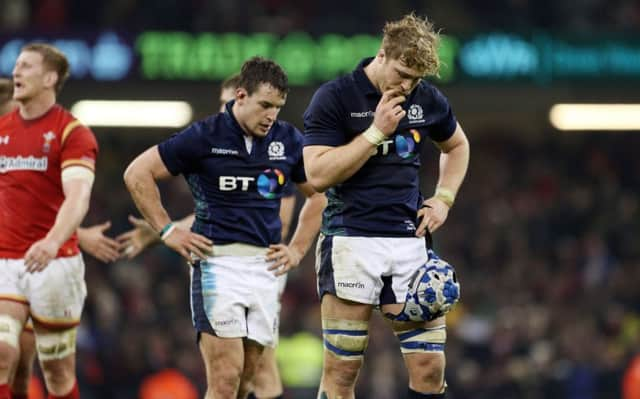Allan Massie: Scotland's losing habit is becoming boring


It gets boring, but we can’t say it is all due to bad luck or misfortune or refereeing blunders. We have now lost our last nine Six Nations matches. In six of them, as Tom English has remarked, the margin of defeat was seven points or fewer. This says something. We are close to winning but nevertheless still losing. Repeatedly.
It was a good match in Cardiff. Both sides played much fine rugby. What was the difference between them? I reckon it was this. Scotland were confident they could win. Wales were confident they would win. Scotland have little experience of winning close matches, Wales a good deal of that experience. Eleven of Scotland’s squad have never won a match in the Six Nations. The Welsh XV was full of players who have won the championship, even a Grand Slam, and a Lions Test series. Scotland take the field full of hope and determination. We cheer them on, but can’t stifle the suspicion that something, somehow, some time will go wrong. It’s frustrating for everyone, and must be hell for the players.
Advertisement
Hide AdAdvertisement
Hide AdAt the moment, two rounds in, Wales look the best team and most likely champions, even though they have to go to Twickenham.
It’s hard to know just what to make of England. They haven’t conceded a try yet, but in Rome they were dreadful, and were outplayed by Italy, for 50 minutes. Fifty-two actually, which was when Jonathan Joseph latched on to a loose Italian pass and scampered away to score. After that it was all England and they looked very good.
There’s a general feeling that referees, unconsciously no doubt, tend to favour the higher-ranked side. That wasn’t quite the case in Rome where England were penalised more often than Italy in the first 50 minutes. But there was one incident which supported that suspicion. James Haskell, the England flanker, tackled Luke McLean in the air. He was penalised, but escaped the yellow card which that offence is now usually deemed to merit. My immediate reaction was that, if this had happened the other way round, the Italian tackler would have been on the sidelines for ten minutes.
We traditionalists have reluctantly had to accept that rugby is now a squad game rather than a strictly 15-a-side one. This development also favours the big battalions. It was evident last week that the English bench was much stronger than the Italian one, and the Welsh bench somewhat stronger than the Scottish one. Props are rarely expected to last more than 60 minutes these days but Vern Cotter kept Willem Nel on for the full 80, rather than expose young Zander Fagerson to the wiles and power of Gethin Jenkins. The upshot was, of course, that Nel tired as props used to do, and dropped two passes in the last ten minutes, something he hardly ever does.
There was an interesting use of the squad in Paris, where Guy Noves started with props who are good ball-carriers but not, on the evidence of that game against Ireland, great scrummagers. Soon after half-time he replaced them with his best scrumming props, and thereafter France controlled most of the play. I assume his thinking was that, particularly on a wet day, there tend to be more set scrums the longer a match goes on, as players tire and make handling errors.
Finally, we should all be cheered up by the performances of John Dalziel’s Under-20 team. Having beaten England handsomely, they all but beat Wales, and this despite being deprived on account of pro-team calls of three players: Blair Kinghorn, James Ritchie and Adam Hastings. Surely the national under-20 side should have priority?
The SRU has no control over Hastings, who is contracted to Bath, but Kinghorn and Ritchie, as Edinburgh players should, one thinks, have been made available to Dalziel – all the more so because, while missing the international against Wales, they were only on the bench for Edinburgh.